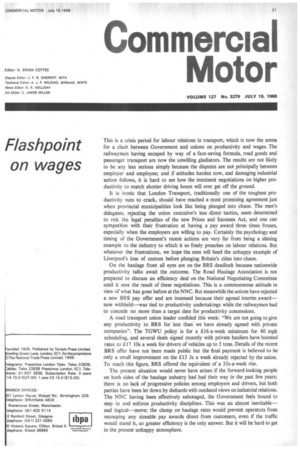Commercial Motor
Page 23

If you've noticed an error in this article please click here to report it so we can fix it.
VOLUME 127 No. 3279 JULY 19, 1968
This is a crisis period for labour relations in transport, which is now the arena for a clash between Government and unions on productivity and wages. The railwaymen having escaped by way of a face-saving formula, road goods and passenger transport are now the unwilling gladiators. The results are not likely to be any less serious simply because the disputes are not principally between employer and employee; and if attitudes harden now, and damaging industrial action follows, it is hard to see how the imminent negotiations on higher productivity to match shorter driving hours will ever get off the ground.
It is ironic that London Transport, traditionally one of the toughest productivity nuts to crack, should have reached a most promising agreement just when provincial municipalities look like being plunged into chaos. The men's delegates, rejecting the union executive's less direct tactics, seem determined to risk the legal penalties of the new Prices and Incomes Act, and one can sympathise with their frustration at having a pay award three times frozen, especially when the employers are willing to pay. Certainly the psychology and timing of the Government's recent actions are very far from being a shining example to the industry to which it so freely preaches on labour relations. But whatever the frustrations, we hope the men will heed the unhappy example of Liverpool's loss of custom before plunging Britain's cities into chaos.
On the haulage front all eyes are on the BRS deadlock because nationwide productivity talks await the outcome. The Road Haulage Association is not prepared to discuss an efficiency deal on the National Negotiating Committee until it sees the result of these negotiations. This is a commonsense attitude in view of what has gone before at the NNC. But meanwhile the unions have rejected a new BRS pay offer and are incensed because their agreed interim award— now withheld—was tied to productivity undertakings while the railwaymen had to concede no more than a target date for productivity concessions.
A road transport union leader confided this week: "We are not going to give any productivity to BRS for less than' we have already agreed with private companies". The TGWU policy is for a L16-a-week minimum for 40 mph scheduling, and several deals signed recently with private hauliers have boosted rates to £.17 lOs a week for drivers of vehicles up to 5 tons. Details of the recent BRS offer have not been made public but the final payment is believed to be only a small improvement on the i13 3s a week already rejected by the union. To reach this figure, BRS offered the equivalent of a 35s-a-week rise.
The present situation would never have arisen if the forward-looking people on both sides of the haulage industry had had their way in the past few years; there is no lack of progressive policies among employers and drivers, but both parties have been let down by diehards with outdated views on industrial relations. The NNC having been effectively sabotaged, the Government feels bound to step in and enforce productivity disciplines. This was an almost inevitable— and logical—move; the clamp on haulage rates would prevent operators from recouping any sizeable pay awards direct from customers, even if the traffic would stand it, so greater efficiency is the only answer. But it will be hard to get in the present unhappy atmosphere.




















































































































